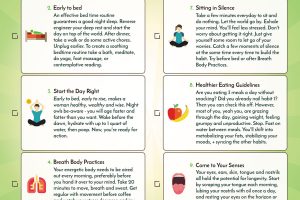Top 10 Habits for a Healthy and Positive Lifestyle

Living a healthy and fulfilling life is often a topic of conversation among friends and family. From personal experiences to advice shared in books and articles, it’s clear that certain habits can significantly impact our overall well-being.
- Top 10 Habits for a Healthy and Positive Lifestyle
- The Importance of Healthy Habits
- Habit 1: Regular Exercise
- Benefits of Physical Activity
- Tips for Establishing a Workout Routine
- Habit 2: Balanced Diet
- Importance of Eating Nutrient-Dense Foods
- Healthy Eating Habits to Adopt
- Habit 3: Sufficient Sleep
- Impact of Sleep on Overall Health
- Strategies for Improving Sleep Quality
- Habit 4: Stress Management
- Recognizing Signs of Stress
- Effective Coping Mechanisms
- Habit 5: Mindfulness and Meditation
- Benefits of Mindfulness Practices
- How to Incorporate Meditation into Daily Routine
- Habit 6: Social Connections
- Importance of Building Strong Relationships
- Ways to Nurture Social Connections
- Habit 7: Positive Thinking
- Power of Optimism on Mental Health
- Techniques for Cultivating a Positive Mindset
- Habit 8: Emotional Well-being
- Acknowledging and Addressing Emotions
- Self-Care Practices for Emotional Wellness
- Habit 9: Time Management
- Organizational Skills for Efficient Time Use
- Prioritizing Activities for Work-Life Balance
- Habit 10: Continuous Learning and Personal Growth
- Benefits of Lifelong Learning
- Strategies for Personal Development
The Importance of Healthy Habits
Developing a set of positive habits can pave the way for a more balanced and joyful life. These habits aren’t about making drastic changes overnight but rather about incorporating small, manageable adjustments into daily routines. For instance, consider how choosing to take a daily walk can elevate mood and improve health. Here are some key benefits of adopting such habits:
- Enhances mental clarity
- Boosts energy levels
- Encourages better relationships
- Facilitates personal growth
As we delve into this guide, the following sections will explore ten essential habits, offering practical tips and insights to help everyone achieve a more vibrant lifestyle.
Habit 1: Regular Exercise
As we explore the first essential habit to foster a healthier lifestyle, the importance of regular exercise becomes evident. Incorporating physical activity into daily routines is not just about breaking a sweat—it’s a pathway to improving overall quality of life.
Benefits of Physical Activity
Engaging in regular exercise yields numerous benefits, including:
- Improved Mood: Physical activity releases endorphins, often referred to as “feel-good” hormones.
- Increased Energy Levels: A consistent workout routine can enhance stamina and reduce fatigue.
- Enhanced Physical Health: Regular exercise helps maintain a healthy weight and reduces the risk of chronic diseases, such as diabetes and heart disease.
Tips for Establishing a Workout Routine
Creating a sustainable exercise routine doesn’t have to be daunting. Here are some practical tips:
- Start Small: Begin with short sessions—maybe just 10 to 15 minutes a day.
- Find Enjoyable Activities: Whether it’s dancing, cycling, or yoga, choose something you love.
- Set Achievable Goals: Aim for gradual progress, like increasing workout time or intensity gradually.
By embracing regular exercise, individuals can embark on a journey toward a healthier, happier life.
Habit 2: Balanced Diet
Following our exploration of regular exercise, let’s dive into another pillar of a vibrant lifestyle: maintaining a balanced diet. Eating the right foods is crucial for fueling our bodies and minds.
Importance of Eating Nutrient-Dense Foods
Nutrient-dense foods are those that provide high levels of vitamins and minerals relative to their calorie count. Making these a staple in your diet not only supports physical health but also enhances mental well-being. Some key benefits include:
- Better Energy Levels: Foods rich in nutrients keep energy steady throughout the day.
- Enhanced Immunity: A nutrient-dense diet supports the immune system, making it easier to fend off illnesses.
- Long-term Health: A balanced intake of vitamins and minerals can lower the risk of chronic diseases.
Healthy Eating Habits to Adopt
Implementing better eating habits can transform health. Consider these strategies:
- Plan Your Meals: Set aside time each week to plan nutritious meals to avoid last-minute unhealthy choices.
- Incorporate Whole Foods: Aim to fill your plate with whole grains, lean proteins, fruits, and vegetables.
- Practice Mindful Eating: Slow down and savor meals to help with digestion and recognize hunger cues.
With a focus on a balanced diet, individuals can nourish their bodies while enjoying delicious and wholesome foods.
Habit 3: Sufficient Sleep
Continuing our journey toward a healthier lifestyle, we can’t overlook the significance of sufficient sleep. After all, a well-rested body is essential for achieving overall well-being.
Impact of Sleep on Overall Health
Quality sleep plays a pivotal role in numerous aspects of health. When individuals prioritize rest, they can experience:
- Improved Cognitive Function: A good night’s sleep enhances memory, concentration, and problem-solving skills.
- Better Emotional Regulation: Adequate rest helps manage stress and emotions, reducing the risk of anxiety and depression.
- Physical Health Benefits: Sleep supports metabolic health, immune function, and even weight management.
Strategies for Improving Sleep Quality
Improving sleep quality is attainable with small changes. Here are some effective strategies:
- Establish a Routine: Go to bed and wake up at the same time each day to regulate your body’s internal clock.
- Create a Sleep-Friendly Environment: Keep your bedroom cool, dark, and quiet to promote restful sleep.
- Limit Screen Time Before Bed: Reduce exposure to screens an hour before sleep to avoid disrupting your circadian rhythm.
By prioritizing sufficient sleep, individuals can not only enhance their physical health but also improve their mental clarity and emotional well-being.
Habit 4: Stress Management
As we progress, let’s discuss another crucial habit for maintaining wellness: effective stress management. With our busy lives, learning to cope with stress can significantly improve our mental and physical health.
Recognizing Signs of Stress
The first step in managing stress is identifying its signs, which can manifest both mentally and physically. Some common indicators include:
- Physical Symptoms: Headaches, muscle tension, or fatigue may signal stress overload.
- Emotional Changes: Increased feelings of irritability, anxiety, or sadness can be warning signs.
- Behavioral Shifts: Changes in sleep patterns, appetite, or social withdrawal are also crucial indicators.
Effective Coping Mechanisms
Once stress is recognized, it’s essential to implement coping strategies. Here are some effective techniques:
- Practice Deep Breathing: Taking deep, slow breaths can help calm the mind and body in stressful moments.
- Engage in Physical Activity: Exercise is a natural stress reliever, releasing endorphins that enhance mood.
- Prioritize Time for Hobbies: Engaging in activities you love creates breaks from daily stressors.
By understanding and managing stress effectively, individuals can cultivate a more peaceful and enjoyable life.
Habit 5: Mindfulness and Meditation
Building on our discussion about stress management, let’s explore the transformative power of mindfulness and meditation. These practices can offer a refuge amid life’s chaos, promoting greater peace and clarity.
Benefits of Mindfulness Practices
Integrating mindfulness into daily life can yield numerous advantages, such as:
- Reduced Anxiety: Being present can significantly alleviate feelings of worry and anxiety.
- Improved Focus: Mindfulness helps enhance concentration, allowing individuals to engage more deeply in their tasks.
- Enhanced Emotional Health: Practicing mindfulness fosters greater emotional resilience and a positive outlook.
How to Incorporate Meditation into Daily Routine
Getting started with meditation doesn’t have to be intimidating. Here are some straightforward ways to make it part of your day:
- Start Small: Begin with just five minutes a day, gradually building as you become more comfortable.
- Choose a Quiet Space: Find a dedicated spot free from distractions to create a peaceful atmosphere.
- Use Guided Meditations: Many apps and online resources offer guided sessions that can ease the process.
By embracing mindfulness and meditation, individuals can cultivate inner peace and navigate life with a renewed sense of clarity and purpose.
Habit 6: Social Connections
Following our journey through mindfulness and meditation, let’s turn our attention to another vital habit: cultivating social connections. Strong relationships can enhance our overall well-being and happiness.
Importance of Building Strong Relationships
The benefits of strong relationships extend far beyond companionship. For instance:
- Emotional Support: Friends and family provide a vital support network during difficult times, helping us cope with stress and adversity.
- Better Health: Studies show that social interactions can lead to lower blood pressure, reduced anxiety, and even longer lifespans.
- Increased Happiness: Engaging with others fosters joy and fulfillment, enhancing our overall enjoyment of life.
Ways to Nurture Social Connections
Nurturing these bonds is essential. Here are some practical strategies:
- Schedule Regular Meetups: Plan monthly dinners or coffee dates with friends to maintain personal connections.
- Join Clubs or Groups: Engage in community activities or interest groups to meet new people with similar passions.
- Utilize Social Media Wisely: Stay connected with loved ones through social media, while ensuring that it complements face-to-face interactions.
By prioritizing social connections, individuals can create a rich and supportive network that enhances their well-being and enriches their lives.
Habit 7: Positive Thinking
Continuing our exploration of habits that foster a healthier lifestyle, let’s focus on the power of positive thinking. Embracing optimism can have profound effects on mental health and overall well-being.
Power of Optimism on Mental Health
Optimism is more than just a sunny outlook; it can facilitate resilience and improve stress management. Benefits include:
- Enhanced Emotional Resilience: Positive thinkers are better equipped to bounce back from setbacks and challenges.
- Lower Stress Levels: Maintaining an optimistic perspective can help reduce feelings of anxiety and worry.
- Improved Physical Health: Research indicates that positive thinking can lead to better heart health and immune function.
Techniques for Cultivating a Positive Mindset
Developing a positive mindset is a practice that anyone can adopt. Here are some practical techniques:
- Practice Gratitude: Keep a gratitude journal to regularly reflect on the good things in life.
- Challenge Negative Thoughts: When negativity creeps in, consciously counter it with more positive alternatives.
- Surround Yourself with Positivity: Engage with uplifting content, whether it’s books, podcasts, or motivating quotes.
By incorporating positive thinking into daily life, individuals can significantly enhance their mental well-being and cultivate a more fulfilling existence.
Habit 8: Emotional Well-being
Building on the theme of positive thinking, let’s delve into another essential component of wellness: emotional well-being. Acknowledging and addressing emotions is crucial for maintaining mental health.
Acknowledging and Addressing Emotions
It’s important to recognize that emotions are natural and play a significant role in our lives. By acknowledging how one feels, individuals can:
- Gain Clarity: Understanding emotions can lead to better decision-making and problem-solving.
- Avoid Suppression: Addressing feelings rather than ignoring them can prevent build-up and lead to healthier emotional expression.
- Enhance Relationships: Sharing emotions fosters deeper connections and understanding with others.
Self-Care Practices for Emotional Wellness
Integrating self-care into daily routines can greatly enhance emotional well-being. Consider the following practices:
- Engage in Creative Outlets: Activities like painting, journaling, or playing music can provide a healthy emotional release.
- Establish Boundaries: Knowing when to say no can help individuals protect their emotional energy.
- Seek Support: Whether through talking to a friend or a professional, sharing feelings can alleviate emotional burdens.
By prioritizing emotional well-being, individuals can cultivate a healthy relationship with their feelings, leading to a more balanced and fulfilling life.
Habit 9: Time Management
As we shift our focus toward enhancing productivity, an often-overlooked skill comes into play: effective time management. Mastering this habit can significantly impact your overall quality of life.
Organizational Skills for Efficient Time Use
Developing strong organizational skills is key to managing time effectively. Here are some strategies that can make a difference:
- Create To-Do Lists: Writing down tasks helps keep track of responsibilities and reduces overwhelm.
- Use Digital Tools: Calendar apps and productivity software can help organize daily activities and set reminders.
- Break Tasks into Steps: Dividing larger tasks into manageable actions makes them less daunting and more achievable.
Prioritizing Activities for Work-Life Balance
Balancing professional and personal life is essential for overall well-being. Consider these tips for prioritization:
- Identify Important Tasks: Use the Eisenhower Matrix to separate urgent from important tasks, aiding in smarter decisions on what to tackle first.
- Set Time Limits: Allocate specific time slots for each activity to stay focused and avoid overcommitting.
- Make Time for Yourself: Ensure to schedule breaks and personal time to recharge, promoting a healthier work-life balance.
By honing time management skills, individuals can create a more organized, fulfilling, and less stressful daily routine.
Habit 10: Continuous Learning and Personal Growth
As we conclude this exploration of essential habits for a well-rounded life, let’s focus on the importance of continuous learning and personal growth. Embracing a mindset of lifelong learning can open up new opportunities and enrich personal experiences.
Benefits of Lifelong Learning
The advantages of committing to continuous learning are vast. Consider the following benefits:
- Enhanced Adaptability: Keeping abreast of new information allows individuals to adapt more easily to change.
- Increased Confidence: Gaining new skills contributes to self-assurance in personal and professional settings.
- Broader Perspectives: Engaging with diverse subjects fosters open-mindedness and greater empathy toward others.
Strategies for Personal Development
Integrating learning into daily life doesn’t have to be an overwhelming endeavor. Here are some effective strategies:
- Set Learning Goals: Identify specific skills or topics you want to explore and create a timeline for achieving them.
- Embrace Online Courses: Many platforms offer free or affordable classes on a range of subjects, making education accessible.
- Join Book Clubs or Discussion Groups: Engaging with others in a learning environment enhances knowledge retention and stimulates new ideas.
By committing to continuous learning, individuals not only foster personal growth but also enrich their lives with knowledge and experiences that can lead to greater fulfillment.




